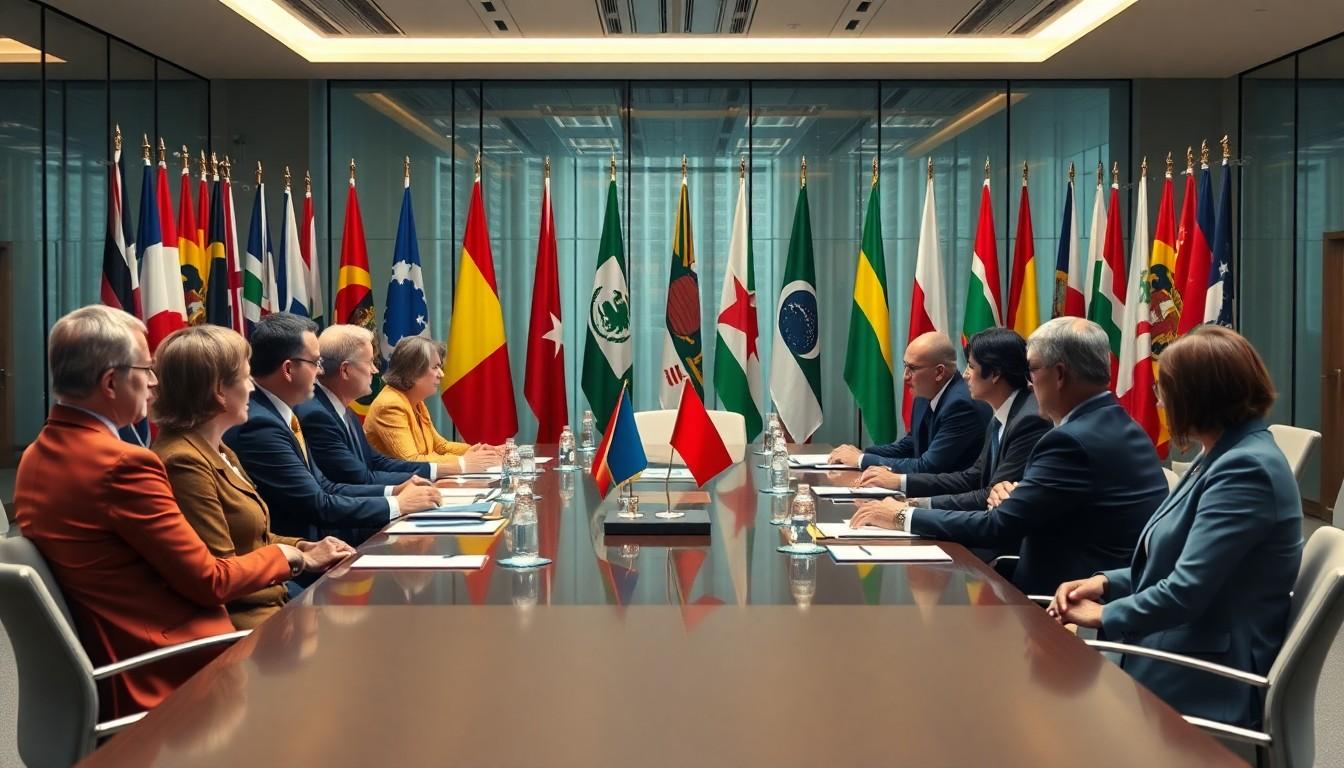The Best Fluffy Pancakes recipe you will fall in love with. Full of tips and tricks to help you make the best pancakes.

Liberalism in International Relations: The Key to Global Cooperation or Just a Dream?
In a world where nations often act like teenagers at a party—loud, unpredictable, and sometimes throwing tantrums—liberalism in international relations offers a refreshing approach. It champions cooperation, diplomacy, and the idea that countries can actually get along without resorting to epic shouting matches. Imagine a global community where dialogue trumps drama, and treaties are more popular than TikTok dances.
Liberalism International Relations
Liberalism in international relations emphasizes cooperative behaviors among states. It promotes the idea that nations can resolve conflicts through dialogue rather than armed confrontation. Treaties and international agreements play crucial roles in this framework, facilitating collaboration. Shared interests drive relationships among states, encouraging democratic values and economic interdependence.
In liberalism, institutions matter significantly. Organizations such as the United Nations and the World Trade Organization illustrate how states can work together for mutual benefit. These institutions provide mechanisms for dispute resolution and cooperation, enhancing stability across regions.
Peaceful coexistence becomes more attainable through the integration of states into a global community. Economic ties, such as trade agreements, create incentives for countries to maintain peaceful relations. When nations rely on one another for goods and services, the costs of conflict rise.
The concept of collective security is also central. By acting together, states can deter aggression and promote a stable international environment. Alliances, like NATO, exemplify how countries can pool resources for mutual defense and support.
Lastly, liberalism recognizes the importance of non-state actors. NGOs, multinational corporations, and civil society play vital roles in shaping policies and fostering cooperation. Their involvement broadens the base for international engagement and facilitates issue-based alliances.
Through these mechanisms, liberalism presents a hopeful vision for global relations, focusing on dialogue, cooperation, and shared benefits among nations.
Key Principles of Liberalism

Liberalism in international relations rests on several core principles that promote cooperation among states. Each principle supports the idea that a collaborative global community fosters peace and stability.
Individual Liberty
Individual liberty stands at the heart of liberalism. Respecting personal freedoms enhances relationships between states. When citizens enjoy rights, nations benefit from stability and prosperity. Security thrives in environments where liberty is upheld, encouraging a culture of dialogue and negotiation. Human rights play a crucial role in shaping foreign policies, as states prioritize the welfare of individuals. Upholding these rights fosters trust and cooperation among nations, leading to stronger alliances.
Democratic Governance
Democratic governance strengthens the fabric of international relations. Governments that derive legitimacy from the consent of the governed tend to engage in peaceful interactions. Democracies are more likely to resolve conflicts through diplomacy and negotiation rather than military means. Citizens in democratic states typically advocate for international cooperation, pushing their leaders to pursue peaceful policies. Additionally, democratic nations often form alliances that promote stability and collective security. Such governance promotes transparency, accountability, and effective communication on the global stage.
Free Markets
Free markets facilitate economic interdependence among nations. Economic ties create incentives for cooperation and peaceful coexistence. Nations that trade extensively are less likely to engage in conflict, as conflicts jeopardize mutual interests. Open markets foster innovation, competition, and economic growth, benefiting all involved. Additionally, globalization enhances the interconnectedness of economies, making peaceful relations essential for prosperity. Liberalism champions free trade agreements that lower barriers and enhance collaboration, thus deepening economic partnerships.
Historical Development of Liberalism
Liberalism in international relations has evolved significantly over time. Its development showcases the shift in focus from individual rights to broader global cooperation.
Classical Liberalism
Classical liberalism emerged in the 17th and 18th centuries, emphasizing limited government and individual liberties. Thinkers like John Locke and Immanuel Kant argued that human reason and moral principles could guide nations toward peace. Individuals within this framework possess inherent rights, and governments exist to protect these rights. The social contract theory also gained prominence during this time, suggesting that states must prioritize the welfare of their citizens. Consequently, the notion of cooperation among states began to take root, laying the groundwork for future liberal thought.
Modern Liberalism
Modern liberalism developed in the 20th century, adapting to the complexities of contemporary global politics. Key features include a strong emphasis on democracy, economic interdependence, and international institutions. The focus shifted to how states could collaborate to address global challenges, such as climate change and security threats. Scholars like Robert Keohane and Joseph Nye introduced concepts like complex interdependence, highlighting the interconnectedness of nations. International organizations, such as the United Nations and the European Union, have become central to facilitating cooperation. Through these mechanisms, modern liberalism promotes a vision of a more integrated and peaceful world.
Liberalism Versus Other Theories
Liberalism contrasts sharply with other international relations theories, notably realism and constructivism.
Realism
Realism focuses on power dynamics and the anarchic nature of the international system. States prioritize their national interests, often leading to competition and conflict. Realists argue that military strength remains essential for survival, emphasizing a zero-sum approach where one state’s gain equates to another’s loss. While liberalism promotes cooperation, realism considers diplomacy merely a strategy to achieve power. Key realists like Thomas Hobbes assert that without a central authority, states act primarily in self-interest. This perspective underscores a more pessimistic view of global relations, one that often clashes with liberal ideals of collaboration and mutual benefit.
Constructivism
Constructivism introduces a different lens by emphasizing the social dimensions of international relations. While liberalism sees states as rational actors focusing on material benefits, constructivism highlights how identities and norms shape state behavior. Relationships among states form through interactions, with shared beliefs influencing actions and policies. Constructivists argue that nothing is predetermined; rather, realities are constructed through dialogue and social context. This theory aligns with liberalism’s emphasis on cooperation but diverges in how it perceives the influence of culture and ideology. In this way, constructivism adds depth to the understanding of international relations, showing how ideas and values drive state interactions.
Contemporary Applications of Liberalism
Liberalism influences various aspects of international relations today, promoting cooperation and peace. Institutions and humanitarian efforts exemplify these applications.
International Institutions
International institutions play a vital role in liberalism by facilitating cooperation among states. Organizations like the United Nations (UN) and the World Trade Organization (WTO) establish norms that govern state behavior. They encourage diplomacy and dialogue, reducing the likelihood of conflict. Enhanced collective security comes from states collaborating under shared goals. Regions benefit from stability and conflict resolution mechanisms provided by these institutions. Increased participation in international agreements shows states’ commitment to liberal principles. Overall, international institutions are essential for fostering cooperation and peace.
Humanitarian Interventions
Humanitarian interventions demonstrate liberalism’s focus on human rights and global welfare. States engage in interventions to protect vulnerable populations from atrocities. Examples like NATO’s intervention in Kosovo highlight collective action in response to humanitarian crises. These actions prioritize human rights, showcasing the belief that states have responsibilities beyond their borders. Support for interventions aligns with liberal values, emphasizing the importance of protecting individual liberties. By intervening in crises, states contribute to a global community aimed at preventing suffering and promoting stability. Humanitarian efforts thus reflect a central tenet of liberalism, prioritizing the welfare of individuals worldwide.
Challenges to Liberalism
Liberalism faces notable challenges in today’s international landscape. Rising nationalism presents a significant hurdle for cooperative dialogue among nations. Countries increasingly prioritize national interests over collective goals, leading to a breakdown in multilateral agreements. This trend often results in protectionist policies and a rejection of global governance, undermining partnerships that liberalism cultivates.
Authoritarian regimes impose another challenge to liberalism. Such governments resist the democratic values that underpin liberalism, favoring centralized control and limited personal freedoms. Authoritarianism often leads to state repression, conflict, and an environment hostile to cooperation. Democratic states struggle to engage effectively with these regimes, which complicates efforts to promote human rights and global stability. The clash between liberal democratic values and authoritarian practices obstructs meaningful international dialogue and collaboration.
Liberalism in international relations offers a framework for fostering cooperation and dialogue among nations. By emphasizing shared interests and economic interdependence, it promotes peaceful coexistence through diplomacy rather than conflict. The role of international institutions is crucial in this pursuit, providing mechanisms for dispute resolution and enhancing stability.
However, the rise of nationalism and authoritarianism poses significant challenges to liberal ideals. These trends threaten to undermine the collaborative spirit essential for addressing global issues. Despite these obstacles, the principles of liberalism remain vital in striving for a more peaceful and interconnected world. The ongoing commitment to dialogue and cooperation will determine the future of international relations in an increasingly complex landscape.
